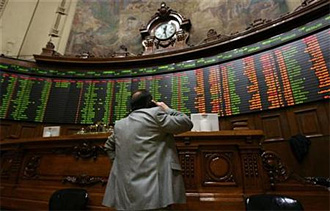
|  |  |  Business News | October 2008 Business News | October 2008  
Has Latin America Really Learned from Past Crises?
 Hugh Bronstein - Reuters Hugh Bronstein - Reuters
go to original


| | A trader talks on his cell phone as he looks an electronic board inside Santiago's Stock Exchange October 13, 2008. (Reuters/Ivan Alvarado) | | |
Bogota - What lessons has Latin America learned from past economic crises? Investors are about to find out as the region gets tested by slumping commodity prices and a credit crunch that is pushing the world toward recession.

Some Latin American governments are better prepared than others to weather the turmoil. But fund managers would do well to keep an eye on even the best-prepared countries, such as Chile, Mexico, Colombia and Brazil, for policy slippage as their economies slow.

"I do not take it for granted that the countries that have been doing the right thing will continue doing it," said Goldman Sachs emerging markets expert Alberto Ramos in New York.

The months to come will show which governments stick by the market-friendly policy stance they adopted over the last six years of easy, commodities-driven growth, and which loosen those policies in a desperate bid to prop up growth.

"This crisis will be their first real test," Ramos said. "Do they really believe in higher interest rates to control inflation or do they believe in lower rates to make the economy grow on steroids?"

Some fiscal and monetary easing may be called for as growth slows. The problem will come if countries go too far in loosening policy or if they go back to imposing trade barriers, capital controls and heavily managing their currencies.

From 2002 to 2008 Latin America enjoyed nearly ideal global conditions driven by high prices for the commodities produced in the region, such as oil, grains, copper and coffee.

Some nations, bludgeoned by crises from 1998 through 2002, appear to have learned that inflation targeting is more important than focusing on propping up their currencies and economic growth rates though high spending and borrowing.

Mexico, Brazil, Chile and Peru have embraced fiscal and monetary policies meant to provide long-term stability.

These countries have used the 2002-2007 growth period to increase foreign exchange reserves, providing a cushion now that commodity prices are diving along with global growth.

"It is an open question whether (those) reserves are high enough, and monetary/fiscal policy is tight enough, to handle a shock of this size," said Amer Bisat, a fund manager at New York-based Traxis Partners.

Brazil, Mexico and Argentina have all tapped reserves in recent weeks to avoid sharp depreciation of their currencies.

Colombia still has higher-than-ideal deficits despite record investment and President Alvaro Uribe is known for lambasting the central bank for not cutting rates.

"It would be a mistake at this point to ease fiscal policy massively and monetary policy massively and forget about inflation targeting," said one New York-based fund manager who asked not to be named due to company policy.

Chief bankers from Mexico, Brazil, Chile, Argentina, Peru and Colombia met in the Chilean capital Santiago on Sunday to discuss the deepening global financial crisis and how best to shield the region from its fallout.

"We're in better shape to face the financial turbulence, thanks to solid economic fundamentals," they said in a joint statement issued after the talks.

The meeting followed a week-long gathering in Washington of the International Monetary Fund's 185 member countries to debate actions to halt the financial hemorrhaging caused by the worst financial crisis in decades.

CRISIS YEARS, LESSONS LEARNED?

Latin America entered a period of crises starting with fallout from a series of Asian currency devaluations in 1997.

The emerging markets tumult continued through Russia's 1998 debt default, Brazil's 1999 devaluation, Argentina's 2001 economic meltdown and jitters over Brazil's 2002 election of one-time leftist labor boss Luiz Inacio Lula da Silva as president. Lula has since adopted market-friendly policies.

But Ramos of Goldman Sachs reminds investors that the Brazilian leader is only now facing his first tough challenge.

"Is Lula a populist at heart or does he really believe in the policies he has implemented?" Ramos said. "The current crop of governments in Latin America has never had to show us their true policy convictions. They have been managing abundance, which is easy."

The left-leaning governments of Venezuela, Argentina and Ecuador have inspired less faith among investors even as their commodities-based economies boomed.

These countries have less flexibility going into the downturn in oil and grain prices. If they stick with their current policies, which is likely for ideological reasons, their economies will underperform, Ramos said.

"This tougher environment will differentiate those countries that have a powerful engine and those who were going fast just because they were driving downhill," Ramos said.

(Editing by James Dalgleish) |

 |
|  |



